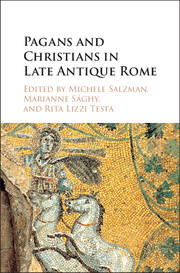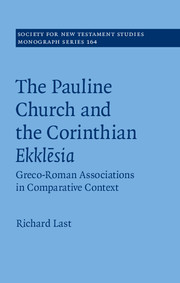Refine search
Actions for selected content:
23990 results in Ancient history
8 - Agricultural Production and Domestic Activities in Rural Hellenistic Greece
- from Part II - Household Production for Markets
-
-
- Book:
- The Ancient Greek Economy
- Published online:
- 05 November 2015
- Print publication:
- 12 November 2015, pp 187-204
-
- Chapter
- Export citation
Chapter 10 - Phokis
-
-
- Book:
- Federalism in Greek Antiquity
- Published online:
- 05 November 2015
- Print publication:
- 05 November 2015, pp 199-221
-
- Chapter
- Export citation
Contents
-
- Book:
- Roman Festivals in the Greek East
- Published online:
- 05 November 2015
- Print publication:
- 05 November 2015, pp ix-xii
-
- Chapter
- Export citation

Pagans and Christians in Late Antique Rome
- Conflict, Competition, and Coexistence in the Fourth Century
-
- Published online:
- 05 November 2015
- Print publication:
- 12 November 2015
Chapter 6 - John Malalas and ritual aetiology
- from Part II - Roman festivals in the Greek East after Constantine
-
- Book:
- Roman Festivals in the Greek East
- Published online:
- 05 November 2015
- Print publication:
- 05 November 2015, pp 184-200
-
- Chapter
- Export citation
Index
-
- Book:
- Roman Festivals in the Greek East
- Published online:
- 05 November 2015
- Print publication:
- 05 November 2015, pp 355-363
-
- Chapter
- Export citation
Chapter 11 - Magic in a Christian Empire
- from Part III - Christianity and private ritual
-
- Book:
- Roman Festivals in the Greek East
- Published online:
- 05 November 2015
- Print publication:
- 05 November 2015, pp 268-304
-
- Chapter
- Export citation
Glossary
-
- Book:
- Federalism in Greek Antiquity
- Published online:
- 05 November 2015
- Print publication:
- 05 November 2015, pp xvii-xx
-
- Chapter
- Export citation
Chapter 10 - Incubation in a Christian world
- from Part III - Christianity and private ritual
-
- Book:
- Roman Festivals in the Greek East
- Published online:
- 05 November 2015
- Print publication:
- 05 November 2015, pp 241-267
-
- Chapter
- Export citation
Contents
-
- Book:
- Federalism in Greek Antiquity
- Published online:
- 05 November 2015
- Print publication:
- 05 November 2015, pp v-vii
-
- Chapter
- Export citation
Index
-
- Book:
- Federalism in Greek Antiquity
- Published online:
- 05 November 2015
- Print publication:
- 05 November 2015, pp 590-605
-
- Chapter
- Export citation
Dedication
-
- Book:
- Roman Festivals in the Greek East
- Published online:
- 05 November 2015
- Print publication:
- 05 November 2015, pp vii-viii
-
- Chapter
- Export citation
Part III - Christianity and private ritual
-
- Book:
- Roman Festivals in the Greek East
- Published online:
- 05 November 2015
- Print publication:
- 05 November 2015, pp 239-322
-
- Chapter
- Export citation
Chapter 11 - Microfederalism in Central Greece: the Dorians and Oitaians
-
-
- Book:
- Federalism in Greek Antiquity
- Published online:
- 05 November 2015
- Print publication:
- 05 November 2015, pp 222-230
-
- Chapter
- Export citation
Chapter 23 - Federalism in the Kyrenaïka?
-
-
- Book:
- Federalism in Greek Antiquity
- Published online:
- 05 November 2015
- Print publication:
- 05 November 2015, pp 419-433
-
- Chapter
- Export citation
Chapter 20 - Federalism on Crete: The Cretan Koinon and thekoinonof theOreioi
-
-
- Book:
- Federalism in Greek Antiquity
- Published online:
- 05 November 2015
- Print publication:
- 05 November 2015, pp 377-385
-
- Chapter
- Export citation
Chapter 19 - Federalism and the sea. Thekoinaof the Aegean islands
-
-
- Book:
- Federalism in Greek Antiquity
- Published online:
- 05 November 2015
- Print publication:
- 05 November 2015, pp 358-376
-
- Chapter
- Export citation
Chapter 3 - The community of the Hellenes
-
-
- Book:
- Federalism in Greek Antiquity
- Published online:
- 05 November 2015
- Print publication:
- 05 November 2015, pp 49-65
-
- Chapter
- Export citation
Chapter 27 - The economics of federation in the ancient Greek world
-
-
- Book:
- Federalism in Greek Antiquity
- Published online:
- 05 November 2015
- Print publication:
- 05 November 2015, pp 487-502
-
- Chapter
- Export citation

The Pauline Church and the Corinthian Ekklesia
- Greco-Roman Associations in Comparative Context
-
- Published online:
- 05 November 2015
- Print publication:
- 18 November 2015
